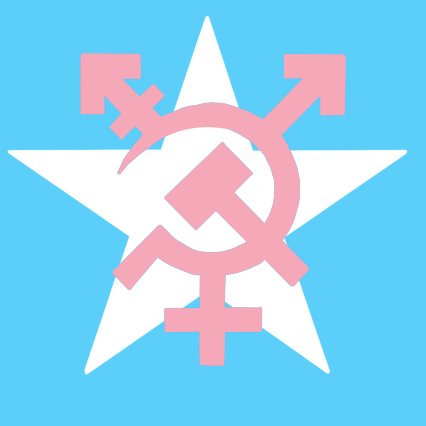A chairdre! It’s time to get into the second essay in Transgender Marxism
The PDF is here: https://transreads.org/wp-content/uploads/2021/07/2021-07-15_60f0b3d5edcb7_jules-joanne-gleeson-transgender-marxism-1.pdf
If you missed the intro discussion: https://lemmygrad.ml/post/395378
Now we’re moving on to the second essay, Trans Work: Employment Trajectories, Labour Discipline and Gender Freedom by Michelle O’Brien
Michelle Esther O’Brien is a militant and practicing psychoanalyst living in New York City. She recently graduated from New York University, with a doctoral thesis addressing how political economy and class politics shape LGBTQ organising in post-austerity NYC. Michelle is a co-editor of Pinko magazine, and was previously a social worker in HIV and AIDS services, and the long-time coordinator of the NYC Trans Oral History Project. She is a queer, a mom, and a communist.
As always, I’ll be pulling quotes and making notes.
Feel free to join in the discussion, or just read along and hopefully we all can learn a little something <3
Edit: the discussion continues with the next essay by Rosa Lee here: https://lemmygrad.ml/post/401480
“She refused to cut her hair, for reasons not yet fully evident to her. ‘My gender dysphoria – I didn’t think of it that way back then – I could not cut my hair. I could not mentally do that’.”
I remember I used to put off haircuts as long as possible, and then when I was finally shamed into cutting my hair I would cry the night before and after.
“People were hostile and threatening to Carolyn on a daily basis. She recounts, ‘from a work perspective, I was completely unemployable’, before listing a series of working-class positions she was offered – contingent on her cutting her hair.”
“She cobbled together precarious and temporary jobs from scattered family members.”
Unreliable employment, gig work, and slipping from job to job (when you’re able to get work at all) is pretty par for the course for most trans people. Those who have regular employment from before they come out often find it nearly impossible to keep that job after coming out. In many cases it requires trying to maintain an entirely separate work persona.
“Carolyn eventually found work as an out trans woman, working at a Manhattan sex toy shop called Babeland. Babeland was lesbian-owned, marketing itself as a feminist and pro-queer store where sex-knowledgeable staff could answer difficult questions. Hiring a trans woman fit broadly into their self-conception as progressive-minded business owners. At the time, it was one of the only formal wage labour jobs where Carolyn could be out as trans. Long after she left Babeland, the workers there unionised, led in part by the many trans people on the staff furious over the gendered harassment they suffered on the job”
Sex-oriented work is usually some of the only work that is openly accepting of out trans people, especially trans women, for the dual reason that sex-oriented work tends to consider itself liberally progressive, and also because society already relegates trans identity to a fringe sexual deviancy.
This however leads to openly trans women in the workplace being considered an object of sexual fetishisation, valued for their position as an object of sexual fetishisation.
“Trans people usually have a hard time finding work, get treated poorly in most of our jobs, and consequently end up poor”
“This gendered choice sharply constrained her employability, contributing to a period of habitual drug use and social marginality. Even as she regained stability in her life, Carolyn’s employment options were sharply limited. The retail job she was able to find was accessible because of subtle gendered expectations. These factors enabled trans people to eventually gain an employment niche there, where they were able to wage a collective struggle as trans workers.”
“Some trans people pass as cis at their jobs, then face the problem of how to manage their resumes and mismatch with the narratives of former employers, or the risk of discovery”
This is what I was touching on earlier. Former employers can act as references only for a deadname. Often contracts with employment, or records of credentials, or banking information, are all registered under a deadname. Trans people are rarely able to take a job without divulging their status of trans, personal information which isn’t remotely pertinent to their ability to do a job, and will often result in discriminatory hiring practices or workplace treatment.
Where trans people are able to pass they tend to build a work persona. Where trans people had the job before coming out they often feel forced to retain a “professional” self: even those trans people able to “pass” are unable to do so during the early stages of transition, which is where employers often take offense at a perceived “lack of professionalism.”
“This chapter focuses on the experiences of trans people unable to pass much at all at their jobs, particularly trans women. The experience of being a gender deviant needing work, and how trans people fight for their economic survival, has much to say about gender freedom for all”
Alright, let’s get into it!
“Under the white supremacist cultural logic of the US, Black and Chinese men were already considered feminine and appropriate for women’s work. But some of the ocean liner companies prided themselves on maintaining a white workforce, offering an elite experience to a white and racist clientele. Few white men, however, would demean themselves by doing such feminised work. Their employers already considered this type of work somehow ‘queer’.”
This is an important point to make when looking at intersectionality. The class structure in a capitalist society is adaptive to the demands for labour. When the colonisers were demanding labour from chattel slaves, they didn’t extend the class of “woman” to Black women. They were expected to toil in the fields alongside the men. When the colonisers needed reproductive labour, they didn’t extend the class of “man” to Black men, who were expected to cook, clean, and take care of the house.
In this way, people of colour have, from the perspective of white, cis het men, always existed as queer bodies. Their need for labour superceded the very gender binary the colonisers invented and imposed in their struggle for primitive accumulation.
“It is here that white gender nonconforming effeminate men managed to get a foothold in the industry. These stewards found a solidarity and support among fellow queens, coming to incorporate drag parties, homoeroticism, and soon a defence of gay rights into their work life.”
“Over workplace struggles through the 1930s, ocean liner service workers formed the Marine Cooks and Stewards Union, bridging these feminised Black men, Chinese men, and white queer men into a Communist-Party-allied militant labour union. These militant workers organised under the slogan ‘No Race-Baiting, Red-Baiting, or Queer-Baiting!’”
Okay but this is an excellent slogan and uh…I may need to work it into a poster.

